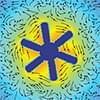Self-propelled nanoparticles could potentially advance drug delivery and lab-on-a-chip systems — but they are prone to go rogue with random, directionless movements. Now, an international team of researchers has developed an approach to rein in the synthetic particles.
Led by Igor Aronson, the Dorothy Foehr Huck and J. Lloyd Huck Chair Professor of Biomedical Engineering, Chemistry and Mathematics at Penn State, the team redesigned the nanoparticles into a propeller shape to better control their movements and increase their functionality. They published their results in the journal Small (“Multifunctional Chiral Chemically-Powered Micropropellers for Cargo Transport and Manipulation”).
A propeller-shaped nanoparticle spins counterclockwise, triggered by a chemical reaction with hydrogen peroxide, followed by an upward movement, triggered by a magnetic field. The optimized shape of these particles allows researchers to better control the nanoparticles’ movements and to pick up and move cargo particles. (Video: Active Biomaterials Lab)
